Analysis: Tensions brewing between Indonesia’s ruling PDI-P and Jokowi, but both sides to play nice for now
Tensions between President Joko Widodo and PDI-P started to emerge mid-2022 over who to back as his successor and deepened this week after Jokowi’s son decided to run as vice president, teaming up with Gerindra’s chairman Prabowo Subianto.
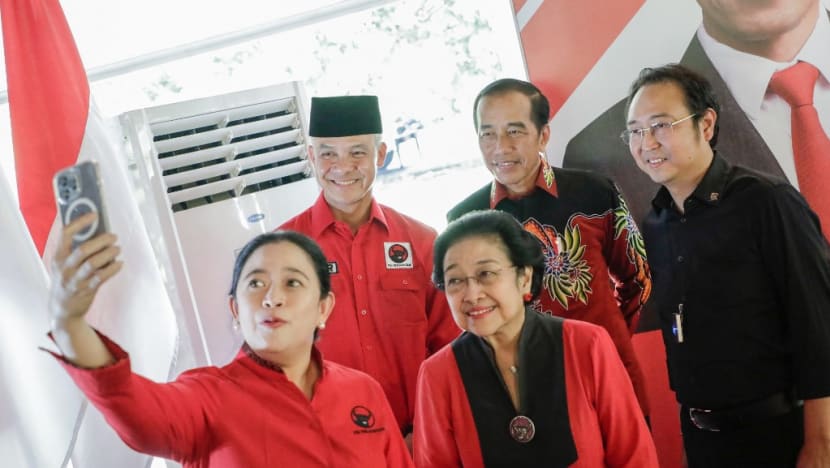
Leaders of the Indonesian Democratic Party of Struggle (PDI-P) (from left) Puan Maharani, Mr Ganjar Pranowo,, Mdm Megawati Soekarnoputri, President Joko Widodo and Mr Prananda Prabowo Suro taking a selfie after Mr Pranowo was selected by the country's largest political party as its candidate for the 2024 presidential election in Bogor on Apr 21, 2023. (Photo: AFP via handout)

This audio is generated by an AI tool.
JAKARTA: A rift between Indonesian President Joko Widodo and the ruling Indonesian Democratic Party of Struggle (PDI-P) has widened after his eldest son decided to stand as a vice-presidential running mate for a presidential candidate not backed by the party, said analysts.
Now, both sides are in a “mutual hostage situation”, where Mr Widodo, known popularly as Jokowi, and PDI-P, which is chaired by former president Megawati Soekarnoputri, cannot engage in open hostilities because they both need each other for political mileage for now, said one analyst.
“On the one hand, President Jokowi still needs PDI-P to maintain the stability of his government until the end of his term,” political analyst Yoes Kenawas from Atma Jaya University told CNA, adding how the president still needs its legislators' backing to push for various programmes, with PDI-P being the biggest party in parliament.
Besides, if the government is unstable, it will hurt his reputation, which could affect his son’s chances at becoming a VP, said Mr Kenawas.
“And on the other hand, PDI-P will be very careful to attack President Jokowi because his approval rating is still very good,” said the analyst, as he pointed out how Jokowi has massive followers and loyal volunteers who will follow whatever he says or believes in.
He added that this prospect will make PDI-P hesitant to attack him openly to avoid damaging its chances at the presidential and legislative elections on Feb 14 next year.
The relationship between both sides has been deteriorating since as early as mid-2022 over their perceived differences in who to back as a presidential candidate in the Feb 14 election, in part fueled by Mr Widodo’s efforts to build his own political dynasty and to protect his legacy.
The latest wedge being driven came when Defence Minister Subianto, 72, who is chairman of the Great Indonesia Movement Party (Gerindra), picked Mr Widodo’s son Gibran Rakabuming Raka, 36, who is also mayor of Solo in Central Java, as his VP running mate.
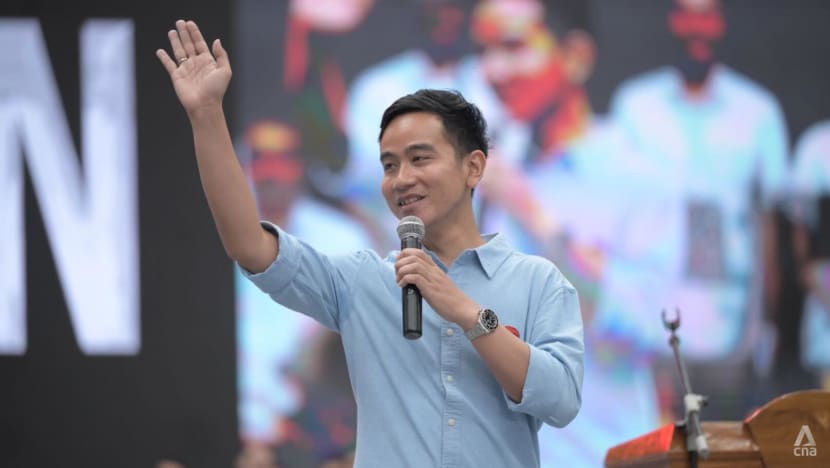
Both registered themselves as presidential and vice-presidential candidates at the election commission on Wednesday (Oct 25), even though Mr Raka was still a member of PDI-P, as is his father.
The candidate pairing was the third and last to register, after former Jakarta governor Anies Baswedan, 54, and the chairman of the Islam-based National Awakening Party (PKB) Muhaimin Iskandar, 57, were the first to register on Oct 19.
Another pair that also registered that same day were former Central Java governor and PDI-P’s Ganjar Pranowo, 54, and running mate, Coordinating Minister for Political, Legal and Security Affairs Mahfud MD, 66.
PDI-P is endorsing former Central Java governor Mr Pranowo and Mr Mahfud.
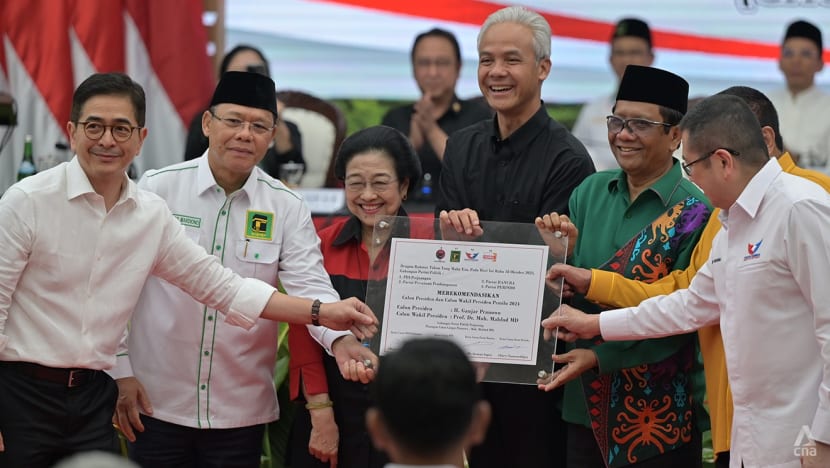
Jokowi, whose approval rating has been consistent since he came into office nine years ago at about 70 per cent, is barred from seeking to run again in next year’s election on Feb 14 as the constitution only allows a person to be president for two terms.
His term will formally end on Oct 20, 2024, when a new president and vice-president will be sworn in.
Until then, analysts believe Jokowi and PDI-P will try to maintain a cordial relationship even though it will become rockier and colder towards and after the Feb elections.
According to various polls, Mr Subianto is leading, followed by Mr Pranowo and Mr Baswedan coming in third place.
Should the February election outcome be similar, then Jokowi and PDI–P will be competing to win over the votes of Mr Baswedan’s camp.
However, once Indonesia has a new president on Oct 20, 2024, Mr Kenawas believes every party will try to consolidate in their own best interests.
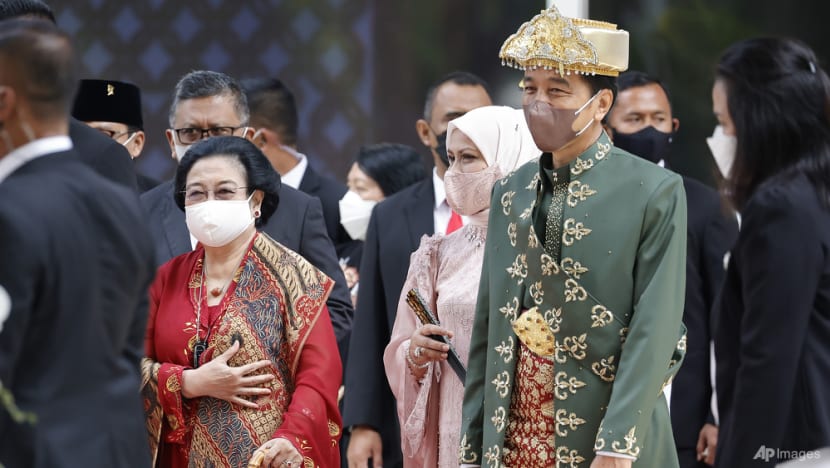
WHEN AND HOW THE RIFT STARTED
Unlike Mdm Soekarnoputri whose father was Indonesia’s first president Soekarno, Jokowi came from a humble background. He was born and raised in a riverside slum of Solo and became a carpenter and entrepreneur after graduating from university.
Jokowi’s political career started when he met PDI-P elite FX Hadi Rudyatmo in 2004 after intending to be Solo’s mayor. Jokowi then joined PDI-P and teamed up with Mr Rudyatmo to be Solo’s mayor and deputy mayor respectively in the city’s 2005 election, which they won.
Jokowi subsequently became Jakarta’s governor in 2012, and while he actually still had three years left in his term, he ran to be Indonesia’s president in 2014, with backing by PDI-P.
At that time, Mdm Soekarnoputri told Jokowi in front of other PDI-P members, two months before the July 2014 election: “Mr Jokowi, I am making you a presidential candidate, but you are a party officer who must carry out party duties.”
When Jokowi won the election against Mr Subianto, many thought he would just be Mdm Soekarnoputri’s puppet.
But Jokowi managed to establish his own identity, being the first elected person who did not come from Indonesia’s political elite or military, and proved critics otherwise.
His relationship with Mdm Soekarnoputri and PDI-P was largely harmonious, having appointed her as head of the steering committee of Pancasila Ideology Development Agency in 2018.
Jokowi sought re-election in 2019 against Mr Subianto and again won the election.
In 2021, he appointed Mdm Soekarnoputri as head of the national research and innovation agency. She attended many state events, and the pair were often pictured together, smiling.
Jokowi has often said that Mdm Soekarnoputri was like his mother, and she has often stated he is like her son and best cadre.
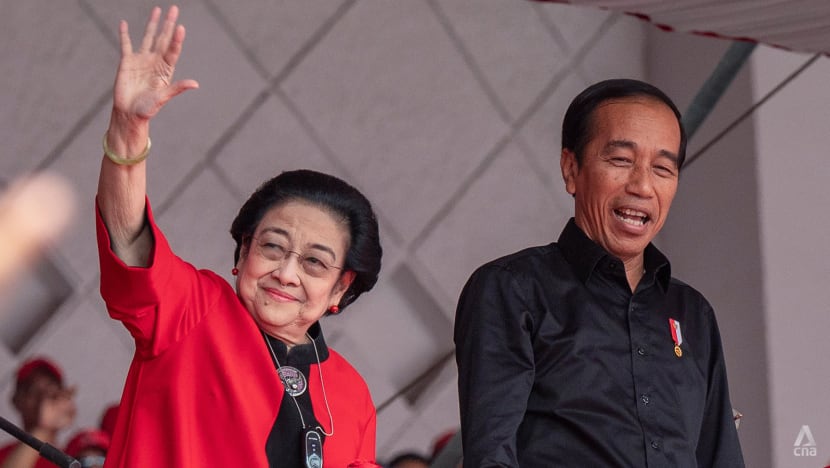
But speculations of their strained relationship started emerging when Mdm Soekarnoputri was absent at several state events in mid-2022.
This came after Jokowi had hinted that he wanted popular Central Java Governor Ganjar Pranowo, a fellow PDI-P member, to run in the upcoming 2024 election.
However, many said Mdm Soekarnoputri then had preferred her daughter, house speaker Puan Maharani, who, according to popularity polls, was not so well-received.
Mdm Soekarnoputri and Jokowi denied the allegations, and the relationship seemed on track when they were pictured again smiling at events.
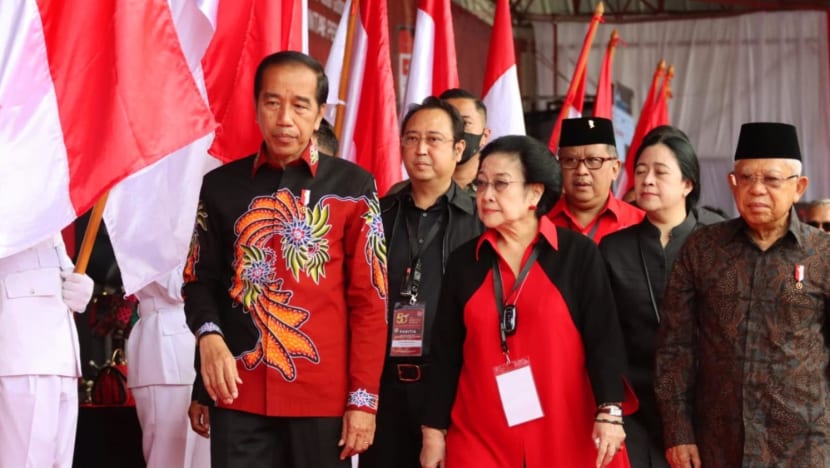
Jokowi though later also hinted on several occasions that he thought Mr Subianto, who in August last year already declared his interest to run again, would be his successor.
In January this year, during the 50th anniversary of PDI-P, which Jokowi attended, Mdm Soekarnoputri boasted about her influence and said: “Without PDI-P, Mr Jokowi is just a poor thing.”
The president, who was in attendance, was seen laughing.
Another sign of a broken relationship between them came in April this year when Mdm Soekarnoputri finally declared Mr Pranowo as PDI-P’s pick for next year’s presidential race.
It was announced in Bogor a day before Eid, which Jokowi also attended.
But he had just landed in Solo that day to celebrate Eid and had to fly back to attend the announcement - a sign cited by analysts that the president was only informed about Mdm Soekarnoputri’s decision at the last minute.
But the rift between PDI-P and Jokowi became crystal clear through how Mdm Soekarnoputri announced on Oct 18 that Mr Mahfud would be Mr Pranowo’s running mate.
Jokowi did not attend the event, unlike when she had announced Mr Pranowo as PDI-P’s presidential candidate in April.
Mdm Soekarnoputri’s daughter Puan Maharani, who is the head of PDI-P’s political and security unit, told reporters Jokowi was absent because he was on a working visit abroad.
But Jokowi had returned to Indonesia on Oct 21, before the registration period ended on Oct 25, which meant that if PDI-P wanted to wait for him to make the announcement, there was still time.
Mr Subianto, for example, only announced Mr Raka as his running mate on Oct 22 and they registered themselves at the election commission on the last registration day.
Related:
JOKOWI’S DYNASTY
Analysts believe all the political manoeuvring by Jokowi is aimed ultimately at protecting his political legacy.
To do so, having his own political dynasty seems to be the safest bet, said political analyst Wawan Mas’udi from the University of Gadjah Mada.
“There are still many national strategic projects which have to be finished, and there is also the new planned capital Nusantara in eastern Kalimantan,” said Mr Mas’udi.
Signs of a Jokowi dynasty emerged when Mr Raka became mayor of Solo in 2021, without any political background.
Other members of the Jokowi family who have entered politics include his son-in-law Bobby Nasution, 32.
Riding on PDI-P’s ticket without political experience, he became the mayor of Sumatra’s biggest city Medan in 2021.
Last month, Jokowi’s 28-year-old second son Kaesang Pangarep, was appointed chair of the youth-oriented Indonesian Solidarity Party (PSI), even though he has no political background.
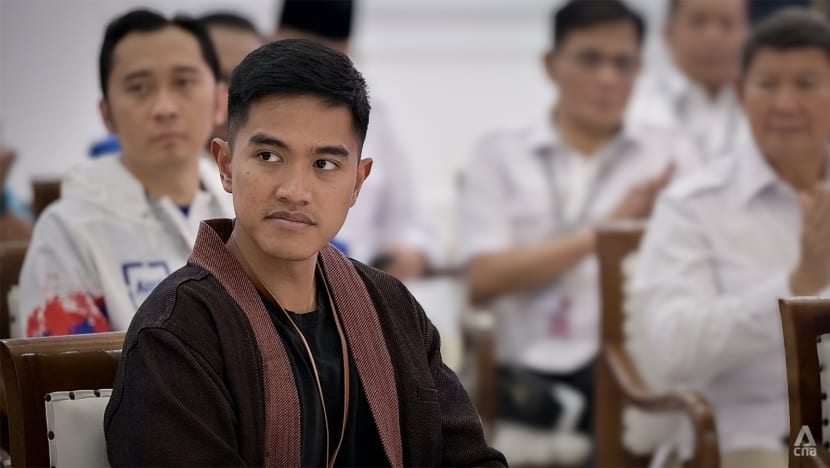
However, the biggest surprise came last week when the Constitutional Court, chaired by Jokowi’s brother-in-law Anwar Usman, expanded the candidacy requirements for presidential and vice presidential hopefuls to include elected officials younger than 40, the minimum age required.
Thus, Mr Raka became eligible to run in next year’s election.
Earlier in June, Jokowi openly admitted during the national meeting of PDI-P that he has the “moral obligation” to meddle in the upcoming election to ensure a smooth transition of power.
“Regarding meddling, I have already conveyed that it is my moral obligation as president during the transitional period in 2024 so that the national leadership can run well without any ripples that could endanger the nation.
“If there are ripples, I cannot be quiet,” he said on Jun 6.
Analysts told CNA that Mr Raka’s emergence as a VP candidate for Mr Subianto is part of efforts by Jokowi to safeguard his legacy.
The best person to work with Mr Raka appears to be Mr Subianto, who also wants to bank on Jokowi’s popularity to finally become president.
In the long term, Jokowi may need his own political party to protect his legacy.
Therefore, having his second son Mr Pangarep heading political party PSI is very strategic for Jokowi, noted Mr Kenawas from Atma Jaya University.
PSI is now in Mr Subianto’s Onward Indonesia Coalition (Koalisi Indonesia Maju).
Related:
OPTIONS AND RISKS FOR PDI-P AND JOKOWI
Analysts say there are options for PDI-P to take against Jokowi, and vice versa, though both sides will have to weigh the benefits against the risks.
One is to sack Mr Raka from the party, though analysts are split on whether PDI-P would do so.
After Mr Raka decided to run with Mr Subianto, many wanted to know whether he was still a PDI-P member.
When asked by CNA on Wednesday (Oct 25) whether he was still a member of PDI-P, Mr Raka played coy.
“I met and spoke with Mdm Puan on Friday (Oct 20),” said Mr Raka, who did not answer when asked what the meeting was about nor when pressed about his membership with the party.
However, political analyst Mr Mas’udi said the situation is unlikely to continue like this, especially because PDI-P is known to dislike people who disobey Mdm Soekarnoputri.
“I think whether Mr Raka leaves PDI-P or not, cadres who are not in line with the party’s moves will be out.
“So he cannot hold on to PDI-P. If he stays, and PDI-P accepts that, then this all is just a political scenario (for PDI-P to grip power),” he said.
Political analyst Ray Rangkuti from Jakarta-based think tank Lingkar Madani has a different opinion and thinks that PDI-P “will play it cool”.
“They will act normal and not target Gibran because they will appear emotional.
“The cards are now in his hands. The uncertainty of this (PDI-P) membership status will make him appear indecisive,” he said, adding that it may affect his electability.
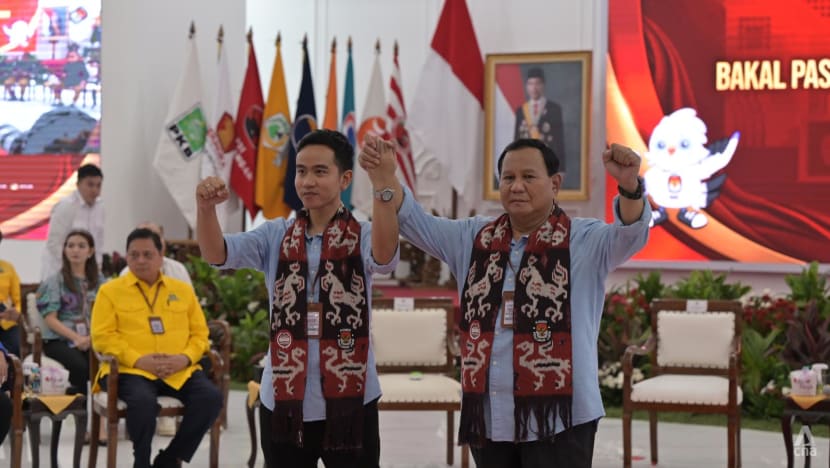
Another option is for PDI-P to trigger an exodus of ministers from Jokowi’s Cabinet.
“That is very possible and will create a certain unrest in the government. And that will be harder for Mr Jokowi,” said Mr Mas’udi.
He said PDI-P ministers can leave the Cabinet by claiming they want to help the party for the legislative election, which will be held simultaneously on Feb 14.
But given the backlash in open hostilities against a popular president, analysts say the more likely scenario is that PDI-P will play nice for the time being - until at least its preferred candidate Mr Pranowo wins the presidential election or when Mr Widodo leaves the presidency in October.
If no presidential candidate gets more than 50 per cent of the votes, the presidential election will go into a second round in June.
According to various polls, Mr Subianto is the current frontrunner, followed by Mr Pranowo and Mr Baswedan trailing behind.
If the February election outcome is similar, then Jokowi and PDI–P will have to try to win over Mr Baswedan’s followers to bolster the chances of Mr Subianto and Mr Pranowo respectively.
This may not be a straightforward battle, said Mr Kenawas, because many factors will come into play, such as who can dominate the parliament and other horse trading moves.
.jpeg?itok=2nUqJQ6s)
However, once Indonesia has a new president on October 20, 2024, Mr Kenawas believes everyone will try to consolidate in their best interests.
For now, Mr Kenawas from Atma Jaya University said a lot more criticism can be expected from PDI-P against the current government’s agenda until the election in February.
“It won’t destabilise the government, but there will be much criticism towards its plans,” he told CNA.
Mr Mas’udi from Gajah Mada University thinks PDI-P will ignore Jokowi’s opinions and not involve him in decision-making processes.
“This is very likely if the relationship is so strained and they cannot reconcile.”
While Jokowi seems to have the upper hand and planned his moves well so far, he would be wise not to take Mdm Soekarnoputri and her PDI-P lightly too, said Mr Kenawas.
“After all, everything can still turn around. Jokowi can be considered a traitor, which could hurt him because all the narratives are evolving,” he added.





















